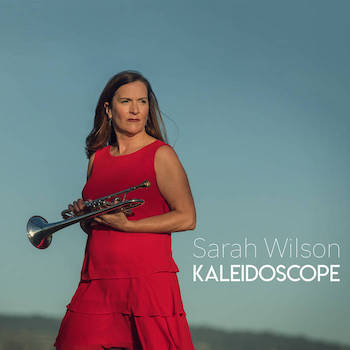Jazz Album Review: Sarah Wilson’s “Kaleidoscope” — Unrelievedly Optimistic
By Michael Ullman
On this disc, trumpeter, singer, and composer Sarah Wilson serves up music that is warm, a little funny at times, and very well played in an unassuming manner.
Sarah Wilson, Kaleidoscope (Brass Tonic Records)

Before trumpeter, singer ,and composer Sarah Wilson was a jazz musician she was a puppeteer. How that came about is fascinating. According to her website, Wilson was an anthropology major at Berkeley who was interested in doing theater — not so much in playing the trumpet. She met a member of Vermont’s venerable Bread and Puppet Theater and crossed the continent to work for one of the company’s shows, which often feature giant puppets. Eventually, she wrote and conducted music for their shows, and that rekindled performing on the trumpet. In 1993, she moved to New York City to concentrate on music, but her puppetry background followed her. Wilson became the music director of Lincoln Center’s annual puppet program. At the same time, she was studying with trumpeters like John McNeil and Laurie Frink.
Frink and McNeil co-authored a trumpet method book entitled Flexus: Trumpet Calisthenics for the Modern Improviser. On her new album, Kaleidoscope, Wilson dedicates “The Hit” to John McNeil and the Afro-Latin “Go” to Laurie Frink, but I don’t hear any exorbitant athleticism in her trumpet playing. She’s given to gorgeous long tones on her open horn; her compositions are sometimes sweetly repetitive, in a folksy way, Her music is warm, a little funny at times, and very well played in an unassuming manner. Her songs, which she sings simply and clearly with only a hint of a vibrato, are unrelievedly optimistic. She explains that her music is related to “avant pop, Afro-Latin grooves and indie rock” as well as to post-bop jazz. I wonder if puppet show music might also be an influence. Her sextet has an unusual instrumentation, but with a rhythm section of Myra Melford, piano, Jerome Harris on bass, and Matt Wilson on drums, it couldn’t be better. The other members are violinist Charles Burnham and guitarist John Schott.
Kaleidoscope‘s first track begins with a solo trumpet chorus, a kind of gentle fanfare in which Wilson states the melody. When she circles round to the melody of “Aspiration” we hear from her accompanists: Matt Wilson, I believe, is playing something like bells, and he is joined by darting, barely audible runs by Schott. Eventually, the bass and piano enter more emphatically. Wilson drops out and invites the band to improvise collectively, which they do without ever losing the simple melody. Dedicated to Carla Bley, the upbeat “Presence” follows. It’s a bouncy piece: it could be a kind of carnival music. This time around, violinist Burnham is the first soloist.
All the pieces but one are composed by Wilson. The exception is the song “Lullaby and Exile” by Matthew Ward. It’s easy to see why she chose it. The lyrics fit exactly her positive viewpoint, and the melody, picked at first by the violinist, is a folksy delight. The lyrics are equally cheerful: “A trance is a spell with a thrill wrapped up inside it/And try as you might to fight it/ Love will get you in the end.” One of the most beautiful pieces in the lineup is “Young Woman,” dedicated to the disc’s pianist, Myra Melford, who also opens the track. The lyrics find the singer “deeply lost,” stumbling amid fear and doubt. The inevitable change occurs once she hears music, presumably Melford’s. “Later in the night heard you on the stage under amber light … your music warmed my cold soul. Felt myself calmed down. Maybe someday I will fill the room with melody all my own.”
Dedicated to John McNeil, “The Hit” begins with Wilson, whose intelligent, spirited drumming is always a joy. The melody is a series of long tones played over Wilson’s chattering background. “With Grace” is a lovely ballad-hymn introduced on guitar. The recording ends with an uptempo calypso number, “Go.” Its second section includes a bass line that is interrupted by the lead instruments, who repeatedly play a rising three-note figure — as if they are offering some sort of contradiction. It’s an amusing conversation, and a fittingly whimsical ending to a session filled with lovely, unpretentious melodies and performances. After listening repeatedly to this disc, I feel that I can assure Wilson that, like Melford, she can fill rooms with melodies all her own.
Michael Ullman studied classical clarinet and was educated at Harvard, the University of Chicago, and the U. of Michigan, from which he received a PhD in English. The author or co-author of two books on jazz, he has written on jazz and classical music for the Atlantic Monthly, New Republic, High Fidelity, Stereophile, Boston Phoenix, Boston Globe, and other venues. His articles on Dickens, Joyce, Kipling, and others have appeared in academic journals. For over 20 years, he has written a bi-monthly jazz column for Fanfare Magazine, for which he also reviews classical music. At Tufts University, he teaches mostly modernist writers in the English Department and jazz and blues history in the Music Department. He plays piano badly.
